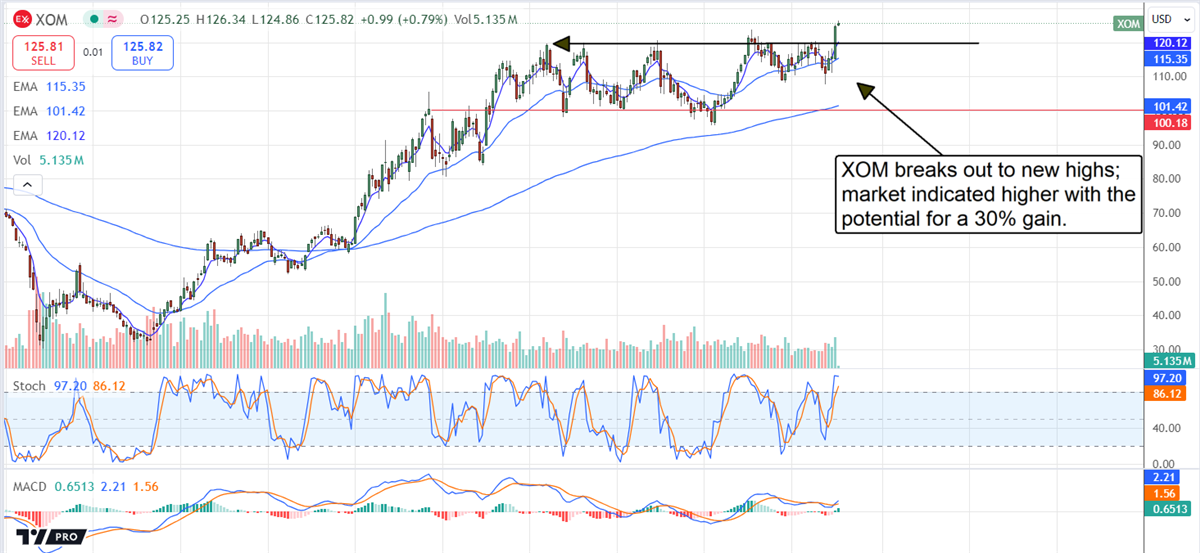- Exxon's struggles with growth are behind it as production growth, acquisition, and price normalization collide.
- The company is set up to outperform in Q3 and Q4, fuel for an analyst's upgrade cycle.
- The technical and valuation forecasts agree that Exxon Mobil has the potential for a 30% upside.
Exxon Mobil (NYSE:XOM) is still a cheap stock, but the value won’t last long. Technically speaking, the market has broken a significant resistance point and is on track to hit the $138 level soon and $200 over the next 12 to 24 months.
Regarding valuation, trading at 15x earnings with earnings growing and expected to continue growing is undervalued, putting XOM stock on track for a price-multiple expansion. A move to align with the S&P 500 average could add 30% to the stock price, aligning with the mid-point of the technical range. Together, the technical and fundamental outlook provide a solid target with a 30% upside potential supported by the fundamentals.
Exxon’s revenue and earnings growth story changed in 2024 from contraction to growth. Oil prices remain volatile, but they trade within a well-established range, which allowed top-line growth to resume with additional production growth and Pioneer. Revenue is growing, and oil prices are rebounding within the range, setting the company up for outperformance and an analyst's upgrade cycle.
Exxon Mobil Pumped Up Its Value With Pioneer
The Pioneer acquisition impacted the balance sheet with increased liability. Still, it offset the damage with increased assets and a 30% increase in equity, along with the improved outlook for revenue growth, cost-efficiency, and earnings. The all-stock deal also left the company well-capitalized and in fortress condition with a total liability of less than 1x equity, strengthening the outlook for capital returns.
The positive cash flow and healthy balance sheet allow for substantial dividend distributions worth more than 3% annually, even with shares trading at record levels. Because of the payout history, low payout ratio, and outlook for earnings growth, it is a reliable payment with expected distribution growth.
The dividend payout may only increase at a low-to-mid-single-digit pace but is sufficient to offset inflation and is compounded by share repurchases. The Pioneer deal increased the total share count by more than 6% on average at the end of Q2, but the total is expected to fall by the end of the year. Exxon is accelerating the pace of planned repurchases following the deal with no significant impact on the balance sheet expected. The company targets $19 billion in repurchases by the end of 2024 and $20 billion in 2025, about 7% of the market cap combined.
Institutions Provide a Tailwind for Exxon Stock
Analysts' revisions are mixed in Q3, with some lowering their price targets for the stock in 2024. However, the takeaways are bullish. XOM stock is pegged at Moderate Buy, which was firm for the last year, and the consensus price target is an all-time high, 10% above the critical resistance break-out point. The consensus has a high conviction and provides a tailwind for the price action, with 11 or 58% of the ratings Buy and 63% of the price targets issued since April above the consensus. The consensus price target is trending higher over the long term, leading the market to the high-end range near $150.
Institutions also provide a tailwind for this energy stock in 2024. They own more than 60% and have bought on balance this year. Buying was heaviest in Q1; net activity turned bearish in Q2 and reverted to buying in Q3, aligning with the late-summer upswing and stock price break out the final week of September.
The Exxon Rally Is Just Getting Started
Exxon’s rally is just starting because the move to new highs ends a multi-year consolidation period. It signals a fundamental-driven shift in the market supported by indicators suggesting more room for it to run. The next significant catalyst will be the Q3 2024 earnings report, due in early November, and it will likely be bullish. The analysts have set the bar low with revisions, expecting a sequential downturn in business and margin contraction, so outperformance is likely. 
